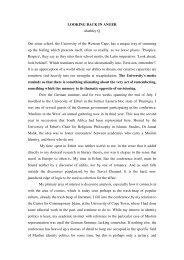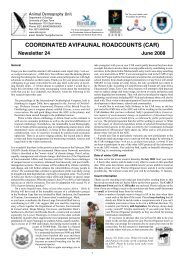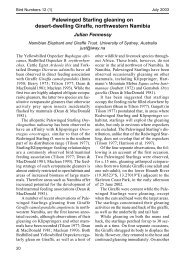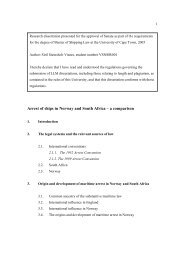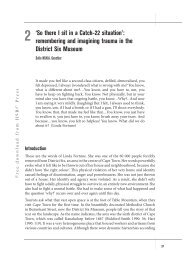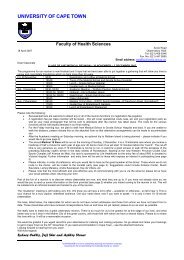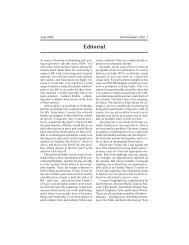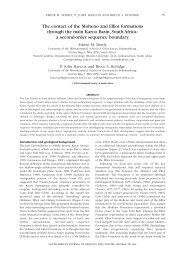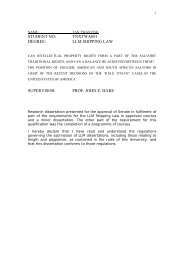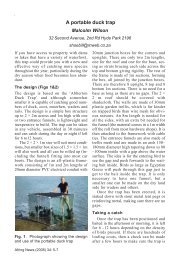insanity.pdf
insanity.pdf
insanity.pdf
Create successful ePaper yourself
Turn your PDF publications into a flip-book with our unique Google optimized e-Paper software.
Africa 7<br />
person’s functioning has been impaired. The DSM-IV TR (APA, 2000)<br />
provides guidelines which assist the clinician in this process. The evidence<br />
which the psychologist presents in court will therefore allude to the presence<br />
of mental illness (for example, Schizophrenia) and how this impacts on the<br />
accused’s functioning.<br />
It is important to note that the psychologist, in providing a diagnosis, is not<br />
required or able to offer an opinion on the accused’s criminal responsibility.<br />
This is a matter to be decided by the courts. As Ogilivie Thompson J A in R v<br />
Harris 1965 (2) SA 340 (A) at 365 B-C states,<br />
... it must be borne in mind that...in the ultimate analysis, the crucial<br />
issue of the appellant’s criminal responsibility for his actions at the<br />
relevant time is a matter to be determined not by psychiatrists but by the<br />
Court itself. In determining that issue - initially the trial Court and on<br />
appeal this Court - must of necessity have regard not only to expert<br />
medical evidence but also to all the other facts of the case, including the<br />
reliability of the appellant as a witness and the nature of his proved<br />
actions throughout the relevant period’. This dictum highlights that the<br />
issue of determining criminal responsibility is a legal question while the<br />
diagnosis of mental illness is a psychological question.<br />
A diagnosis of mental illness does not automatically imply that an accused<br />
is non-responsible. Snyman (2002) says that the fact that a person has been<br />
declared mentally ill in terms of the Mental Health Act 18 of 1973, does not<br />
imply that he or she is also mentally ill in terms of s78(1) of the CPA. This is<br />
because the latter is chiefly concerned with how mental illness negates<br />
responsibility, and not with the nature of mental illness itself. For example, if a Mentally ill<br />
person is diagnosed with Schizophrenia and certified in terms of the Mental offenders are<br />
Health Act 18 of 1973, this does not automatically negate responsibility. In hospitalised for<br />
order for a successful defence to be raised, it has to be<br />
indefinite<br />
Activity 8.6 periods of time<br />
proven that the symptoms of Schizophrenia impaired What kind of psychological knowledge can<br />
the person’s cognitive and/or conative functioning. assist the court in making findings<br />
regarding mental state?<br />
Disposition of Mentally Ill Offenders<br />
Where the court accepts the defence of <strong>insanity</strong>, the accused is found not<br />
guilty and will be remanded into the care of a state psychiatric hospital for an<br />
indefinite period of time (Kruger 1999). For example, in S v Kavin 1978 (2)<br />
SA 731 (W), the court accepted the evidence that the accused’s depression<br />
impaired his conative functioning and therefore he was found not guilty of<br />
murder and attempted murder. He was remanded into the care of a state<br />
psychiatric hospital for an indefinite period, and was declared unfit to possess<br />
a firearm. In cases such as this, provision is made for the review of the<br />
patient’s progress and the hospital may recommend a discharge based on the<br />
prognosis of the illness and the danger which the patient poses to him or<br />
herself and society. This process has to be ratified by the courts, particularly<br />
where the offence has been violent (Kruger, 1980).<br />
The Insanity Defence – Controversies and Challenges<br />
The <strong>insanity</strong> defence in South Africa has not evoked the same kind of<br />
controversy as in the case of American jurisdictions. For this reason it is useful<br />
to explore some of the debates which have plagued legal and psychological



